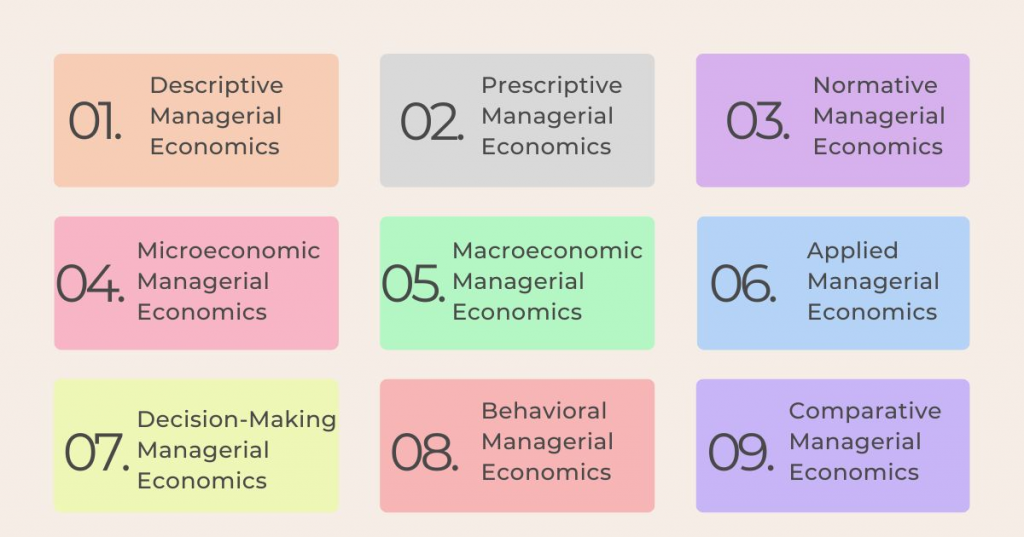What is Managerial Economics? Objectives, Types & Examples
Managerial economics is a vital field that combines economic theory with business practices to facilitate decision-making and future planning by management. It serves as a bridge between economics and the practical demands of running a business, offering tools and techniques to solve managerial problems and optimize organizational performance.
Understanding managerial economics is crucial for managers who make informed decisions in a complex and dynamic market environment.
This article explores the fundamental concepts of managerial economics, including its main objectives, various types, and practical examples that highlight its application in the business world. By delving into these areas, we aim to illustrate how managerial economics can enhance strategic planning, operational efficiency, and overall business success.
What is Managerial Economics?

Managerial economics is a specialized study field that applies economic theories, methodologies, and principles to decision-making processes within businesses and organizations. It focuses on economic analysis to solve managerial problems, optimize resource allocation, and improve overall business performance.
By integrating concepts from microeconomics and macroeconomics with practical business practices, managerial economics provides managers with a robust framework for making informed and effective decisions.
Importance of Managerial Economics

Managerial economics is essential for bridging the gap between theoretical economic concepts and practical business applications. It equips managers with analytical tools and frameworks to make sound decisions, optimize operations, and improve the financial health of the organization. By leveraging economic principles, managerial economics enhances the ability of managers to navigate complex business environments, respond to market changes, and achieve sustainable growth.
In summary, managerial economics is a vital discipline that integrates economic theory with business practice, enabling managers to make informed decisions, optimize resources, and enhance organizational performance.
The main objectives of managerial economics

Managerial economics is a branch of economics that applies microeconomic analysis to specific business decisions. Its main objective is to provide a systematic and logical way of analyzing business decisions to improve the efficiency and effectiveness of an organization. Here are the primary objectives of managerial economics:
Optimizing Resource Allocation
Managerial economics aims to optimize the allocation of scarce resources within an organization. This objective involves determining the best ways to utilize labor, capital, and materials to maximize output and efficiency while minimizing costs.
Decision-Making Framework
One of the core objectives is to provide a robust framework for decision-making. By applying economic principles and quantitative techniques, managerial economics helps managers make informed decisions regarding pricing, production, investment, and other strategic areas.
Resource allocation: Effectively allocating resources across different departments or projects to maximize efficiency and profitability.
Pricing strategies: Determining the optimal pricing for products or services to balance profit margins with customer demand.
Production planning: Making informed decisions about production levels, inventory management, and cost control.
Marketing and investment strategies: Evaluating marketing strategies and potential investments using economic analysis to achieve desired outcomes.
Profit Maximization
The primary goal of most businesses is profit maximization. Managerial economics helps identify the factors that influence profitability and make decisions that align to maximize long-term profits.
Demand Forecasting
Understanding and predicting consumer demand is crucial for business planning. Managerial economics uses various models and statistical techniques to forecast future demand for products and services, helping businesses prepare for market changes and manage inventory effectively.
Cost-Benefit Analysis
Managerial economics assists in evaluating the costs and benefits of different business activities. That helps managers make choices that provide the best net benefit to the organization, such as launching a new product, entering a new market, or investing in new technology.
Risk Management
In a dynamic business environment, managing risk is essential. Managerial economics provides tools and techniques to assess and mitigate risks associated with business decisions, such as market fluctuations, economic downturns, and competition.
Pricing Strategies
Setting the right price for products and services is crucial for profitability and competitiveness. Managerial economics helps enterprises analyze market conditions, cost structures, and consumer behavior to develop effective pricing strategies.
Market Structure Analysis
Understanding the competitive environment is vital for strategic planning. Managerial economics studies different market structures, such as perfect competition, monopolistic competition, and oligopoly, to help businesses formulate strategies that can lead to competitive advantage.
Economic Tools and Theories
Managerial economics equips managers with a toolkit that includes concepts from microeconomics, macroeconomics, statistics, and econometrics. These tools help analyze market conditions, consumer behavior, costs, production, and other factors that influence a firm's success.
In summary, the main objective of managerial economics is to provide a systematic approach to business decision-making that enhances the efficiency and effectiveness of an organization. It helps managers optimize resources, maximize profits, forecast demand, analyze costs and benefits, manage risks, and develop strategic plans.
Types of managerial economics

Managerial economics can be broken down into several types based on how they are used and what they focus on. Here are the main types:
1. Descriptive Managerial Economics
Descriptive managerial economics is a method that describes the various economic phenomena, practices, and events that influence business operations. It focuses on collecting data, presenting facts, and summarizing economic conditions without offering solutions or predictions. This type helps you in understanding the current state of the business environment.
2. Prescriptive Managerial Economics
Prescriptive managerial economics helps manager goes a step further by describing economic situations and providing recommendations for action. It uses economic theories and models to suggest solutions to specific management problems. This type is crucial for decision-making, offering actionable insights and strategic guidance.
3. Normative Managerial Economics
Normative managerial economics deals with what ought to be rather than what is. It involves value judgments about economic policies and practices, recommending actions based on desired outcomes. For example, it might suggest optimal pricing strategies or production levels to achieve specific business objectives.
4. Microeconomic Managerial Economics
Microeconomic managerial economics focuses on the behavior of individuals and firms in making decisions regarding the allocation of limited resources. It includes analyzing market mechanisms, consumer behavior, production and cost functions, and pricing strategies. This type is essential for understanding internal business operations and market interactions.
5. Macroeconomic Managerial Economics
Macroeconomic managerial economics examines the broader economic factors that affect a business, such as national income, inflation, unemployment, and economic growth. It helps managers understand the impact of economic policies, global economic trends, and macroeconomic indicators on their business operations.
6. Applied Managerial Economics
Applied managerial economics involves using economic theories and models to solve practical business problems. It combines microeconomic and macroeconomic principles, addressing issues such as demand forecasting, cost estimation, pricing decisions, and risk management. This type is practical and focuses on real-world applications.
7. Decision-Making Managerial Economics
This type emphasizes the application of economic analysis to the decision-making process within an organization. It involves quantitative techniques, such as regression analysis, linear programming, and decision trees, to make informed decisions on production, investment, marketing, and other business activities.
8. Behavioral Managerial Economics
Behavioral managerial economics studies the effects of psychological, social, and emotional factors on the economic decisions of individuals and institutions. It looks at how real-world decision-making can differ from traditional economic models, which assume people always act rationally.
9. Comparative Managerial Economics
Comparative managerial economics involves comparing different economic systems, policies, or practices to understand their relative effectiveness. It can be used to evaluate the performance of different business strategies, regulatory environments, or market conditions.
Importance of Different Types of Managerial Economics
Each type of managerial economics provides unique insights and tools for addressing various aspects of business management. By integrating these different types, managers can:
Make Informed Decisions
Utilize descriptive and prescriptive economics to gather data and make strategic decisions.
Optimize Operations
Apply microeconomic principles to optimize production processes and resource allocation.
Understand the Economic Environment
Use macroeconomic analysis to anticipate and respond to economic trends and policies.
Solve Practical Problems
Employ applied economics to address real-world business challenges.
Enhance Decision-Making
Leverage decision-making economics to use quantitative techniques for better decision outcomes.
Incorporate Human Behavior
Consider behavioral economics to understand and predict deviations from rational decision-making.
Evaluate and Compare
Use comparative economics to benchmark and improve business practices.
In summary, the different types of managerial economics provide a comprehensive toolkit for managers to navigate the complexities of the business environment, optimize operations, and achieve strategic goals. By understanding and applying these various types, managers can enhance their decision-making capabilities and drive business success.
Managerial economics example

Here's an example of how managerial economics can be applied in a real-world business scenario:
Scenario: A Company Considering a New Product Launch
Imagine a company, ABC Electronics, which is considering launching a new smartphone model. The decision to launch involves several economic analyses to ensure it is profitable and aligns with the company's goals.
1. Descriptive Managerial Economics
ABC Electronics gathers data about the current smartphone market, including sales figures, consumer preferences, and competitor pricing. They find that the demand for smartphones with advanced camera features is high, and competitors are pricing similar models between $600 and $800.
2. Prescriptive Managerial Economics
Based on the data, ABC Electronics' economists recommend launching the new smartphone at a competitive price of $650. They suggest offering promotional discounts during the first month to attract early adopters. They also advise on the marketing strategies to highlight the advanced camera features.
3. Normative Managerial Economics
The company's management considers the recommendation and decides on a pricing strategy that maximizes profits while ensuring affordability. They aim for a price that reflects their value proposition and targets a broader customer base, considering the ethical implications of pricing and affordability.
4. Microeconomic Managerial Economics
ABC Electronics analyzes the cost of production, including raw materials, labor, and overhead. They determine that the variable cost per unit is $400, and fixed costs for the initial production run are $1,000,000. They calculate the break-even point and decide on the production volume needed to cover expenses and generate profit.
5. Macroeconomic Managerial Economics
The company assesses the broader economic environment, including economic growth rates, consumer purchasing power, and inflation. They find that the economy is growing, and consumer confidence is high, which bodes well for the launch of a premium product.
6. Applied Managerial Economics
ABC Electronics uses demand forecasting models to predict sales for the first year. They estimate they can sell 50,000 units in the first year based on market trends and their marketing efforts. They also perform a cost-benefit analysis to determine the expected return on investment.
7. Decision-Making Managerial Economics
The company uses quantitative techniques like regression analysis to identify the relationship between pricing, advertising spending, and sales volume. They create decision trees to evaluate different scenarios, such as various pricing strategies and advertising budgets, to choose the optimal approach.
8. Behavioral Managerial Economics
ABC Electronics considers psychological factors influencing consumer behavior, such as brand loyalty and the impact of social media influencers. They incorporate these insights into their marketing strategy, leveraging influencer partnerships to boost brand credibility and attract potential buyers.
9. Comparative Managerial Economics
The company compares its potential launch strategy with those of competitors who have recently launched similar products. They evaluate the successes and failures of these competitors to refine their approach and avoid common pitfalls.
By applying these different types of managerial economics, ABC Electronics can make informed decisions about its new smartphone launch. They gather relevant data, analyze costs and market conditions, predict demand, and develop effective strategies. This comprehensive approach helps them minimize risks, optimize their pricing and marketing strategies, and increase their chances of a successful product launch.
Let's take the next step with Skilltrans. Please click on the course name below to learn more:
The Fundamentals Of Finance For Non-Finance Professionals
With this programme we're going to give you a simple guide to the core elements of finance that all organisations use to report and manage their results. If you ever have conversations about finance and feel even slightly out of your depth, then this introduction to the Fundamentals of Finance is for you.
Advertising Strategy Fundamentals: Upskill to Drive Growth
Welcome to "Advertising Strategy Fundamentals: Upskill to Drive Business Growth" a comprehensive course designed to equip you with the essential skills to create effective advertising strategies that resonate with your audience and drive business growth. Whether you're a marketer, product manager, CMO, business owner, direct seller, freelancer, entrepreneur, business coach, or startup founder, this course will provide you with actionable insights and practical frameworks to elevate your advertising efforts.
Corporate Social Responsibility (CSR) - An Introduction
There is a lot of misunderstanding what Corporate Social Responsibility really is about- Philanthropy, green PR or indeed a piece of new Conscious Capitalism? This course was designed for you! You, if you want to get to know what CSR is about, first-hand: its development, how it is implemented today and where it is heading in the future. In a bit more than an hour, you will learn the "logics" of CSR and find out how it is really connected to the idea of Sustainability.
Conclusion
Managerial economics plays a key role in bridging the gap between economic theory and practical business applications. Managerial economics integrates economic principles into the decision-making processes. It equips managers with the analytical tools needed to navigate complex business environments.
In summary, mastering the principles of managerial economics empowers managers to enhance their decision-making capabilities, improve efficiency, and drive growth. As the business landscape continues to evolve, the importance of managerial economics in providing a solid foundation for strategic planning and operational success cannot be overstated.
If you want to learn skills related to Managerial Economics, you can register for Skilltrans courses now.

Meet Hoang Duyen, an experienced SEO Specialist with a proven track record in driving organic growth and boosting online visibility. She has honed her skills in keyword research, on-page optimization, and technical SEO. Her expertise lies in crafting data-driven strategies that not only improve search engine rankings but also deliver tangible results for businesses.



